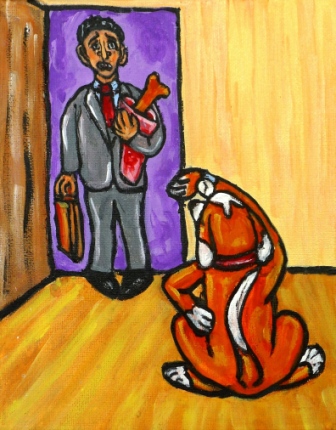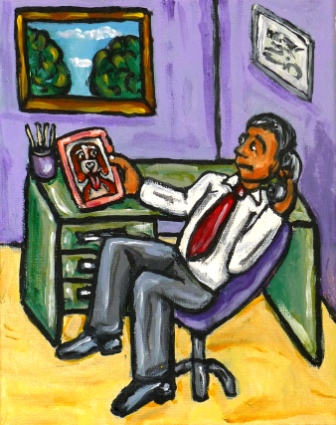The silent epidemic of separation anxiety (ours, that is)

As devoted pack animals, dogs naturally want to be with their human companions at all times. But when canine loneliness and fear become elevated to the point defined as “separation anxiety,” one might as well kiss the antique rocker goodbye.
When my dog Homer was a puppy, my daily departure for work often resulted in a catastrophic whirlwind of property damage. In his first two years, Homer managed to eat a dozen books (his favorite being those from the library), scratch and chew his way through drywall and wood, and howl for hours like a wounded moose (as reported by neighbors on the next block). I learned to buy socks in bulk, and live with furniture that looked like it came from a crack house. Thankfully, he grew out of it, and I was allowed to have a library card again.
Though separation anxiety in dogs is serious, it is well understood and mostly treatable. However, the overwhelming panic some humans experience when apart from their pets has been a shameful secret. While I doubt you will find many people gnawing holes in their briefcases, unfurling rolls of toilet paper, or screaming piteously through a staff meeting, it is only because we are not dogs. We humans have learned to express our hysteria more subtly.
For some dog owners with separation anxiety (reluctantly, I include myself ), the escalating tension resulting from being separated from their animals can be quite unnerving. After an hour of being apart, we begin to envision hysterical dogs crossing their legs, trying not to think of grassy lawns and tree trunks. After two hours, we can barely refrain from calling our wheelchair-bound neighbor to pull herself up two flights of steps to check on the dog’s water dish. After three hours, we spend our lunch breaks speeding home and then back to work, all the while chewing stale breath mints to stave off hunger.
Separation sufferers have been known to cut short dream vacations, leave weddings before the vows are exchanged, and sneak away from family interventions. (“Grandma can kick heroin by herself. Spot needs me!”) We spend the last five bucks in our wallet on doggie treats instead of antacid, and then, after we get home and are sniffed, pawed, greeted, and licked, plop down and wonder why we were so worried in the first place.
Lest you think that adult separation anxiety is a fictional malady, the DSM-V, the authoritative diagnostic standard for psychological impairments, recently recognized adult separation anxiety as a bona fide psychiatric disorder (ASAD for short). Although described primarily in terms of humans separated from other humans, the symptoms of ASAD are no different when the object of our longing is a dog (though you can’t text or tweet a dog ten times an hour).
According to the DSM, symptoms of ASAD include excessive worry, guilt, irritability and depression, not to mention headaches, indigestion, nausea, and sweating. Even those folks unlucky enough to be around someone in the throes of an acute doggie ASAD attack will not soon forget it. I know of one car passenger who, stuck in stubborn traffic with someone desperate to let her dog out to pee, said he needed several margaritas when he finally arrived home.

One would think that leaving your dog with caring, knowledgeable professional people would alleviate some of this anxiety, but this is not always the case. I have been told by staff members of boarding kennels and doggie daycare operations about patrons bringing suitcases full of toys, pages of detailed feeding instructions, and even dirty laundry (for the owner’s familiar odor). Many such folks call daily, sometimes hourly, for reports on their dog’s mental status, and I heard tell of one woman off to a dream vacation who only made it down the kennel driveway before turning around to retrieve her pooch.
Wisely, many such facilities have parlayed the growing ASAD epidemic into cash. The Internet is replete with businesses offering 24-hour videocams in their “individual care units” so a dog’s owner can check on a dog 24/7. Dogs can now stay in executive suites with furniture and lambs wool bedding, receive individualized playtime, snuggle sessions, and daily maid service. Dogs have access to daily use of a water park, soothing music, choice of snacks before bedtime, yappy hours, daily massage sessions, and flat-screen televisions—all for added fees, of course. Got Guilt?
Some people afraid of leaving their dogs at home take them to the supermarket, hardware store, public toilets, buses, and banks. I once saw a dog peeping out of someone’s handbag at a movie. More and more outdoor restaurant patios provide dog water bowls and containers of free dog treats, and one can’t go to an outdoor concert anymore without fearing one’s picnic basket will be mistaken for a fire hydrant.
This is no way to live. People need to be able to enjoy the world outside their home without worrying if Ginger is at home crafting a noose out of her leash. According to therapists I contacted, ASAD should be as treatable as any other anxiety or obsessive-compulsive disorder. Desensitization, relaxation, meditation, behavioral modification, anti-anxiety medications—all could be used singly or in combination to treat this malady. Support groups for ASAD have been popping up in England recently, proving Americans aren’t the only ones literally crazy for their dogs. And I don’t see why meetings could not be formed based on the principles used by recovering addicts. “Hi. My name is Sue and I am a dogaholic. It has been two weeks since I last cried about leaving my dog at home when I went to get groceries.”
Such meetings would, of course, have to be scheduled around thunderstorms, feeding hour, daily walks, play periods, and snuggle time. And I would bet many of the stale cookies would be stuffed in pockets to take home for Fido.
I, for one, want to get this monkey off my back. I would love to be able to work, go to meetings, socialize, attend cultural events, and travel without constantly envisioning morose dogs trying to paw 911. I want to believe that my dogs don’t need me 24/7 and can really survive, even be happy, without me (well, for a time). Maybe a nice, relaxing, peaceful trip away would be therapeutic! Does anyone know of a hotel that will take seven dogs?
